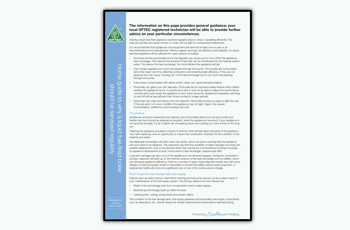Home guide to why a liquid fuel-fired boiler should be serviced regularly
The information on this page provides general guidance; your local OFTEC registered technician will be able to provide further advice on your particular circumstances.
In 2021, oil (kerosene) continues to be the most widely used fuel in off-grid homes. However, to reflect that a renewable liquid fuel, such as HVO may soon be available (see our future heating section) we have used the term liquid fuel in this guide to include both oil and low carbon liquid fuels.
Having a liquid fuel-fired appliance serviced regularly helps to keep it operating efficiently. This reduces fuel bills and saves money on costly call out fees for unexpected breakdowns.
It is recommended that appliances and equipment are serviced at least once a year or as recommended by the manufacturer. Without regular servicing, the efficiency and reliability of a liquid fuel-fired appliance will be affected for many reasons including:
- Excessive smoke and partially burnt fuel deposits can cause soot to form within the appliance heat exchanger. This restricts the amount of heat that can be transferred into the heating system water. The cleaner the heat exchanger, the more efficient the appliance will be!
- Fuel nozzles regulate how much fuel passes through the burner. The nozzles are consumable items that wear over time, affecting combustion and lowering boiler efficiency. If they are not replaced this may cause "sooting up" of the heat exchanger due to too much fuel passing through the burner.
- Fuel pumps contaminated with debris and/or water can cause premature failure.
- Photocells can glaze over with deposits. Photocells are an important safety feature which detect whether the appliance has lit. If a photocell is dirty it may not be able to detect the burner flame correctly and could cause the appliance to shut down randomly. Appliances frequently switching on and off will be less efficient than those running for longer periods.
- Electrodes can wear and attract soot and deposits. Electrodes produce a spark to light the fuel, if they are worn or in poor condition the appliance may not light. Again, this causes inconvenience, inefficiency and increases fuel cost.
The service
Appliances should be inspected and cleaned, and consumable items such as fuel nozzles and flexible fuel lines should be replaced as required, when the appliance is serviced. If your appliance is not serviced annually, it is at a higher risk of breaking down and costing you more money in the long run.
Cleaning the appliance provides a chance to look for other tell-tale signs that parts of the appliance may need replacing, and an opportunity to inspect the combustion chamber for the condition of the material and welds.
Old steel heat exchangers will often have rust marks, which can give a warning that the appliance will soon need to be replaced. This approach can limit the possibility of water damage occurring and enables replacement work to be planned rather than having the inconvenience of trying to arrange an appliance replacement at short notice when a heat exchanger unexpectedly fails.
Long term damage can also occur if the appliance is not serviced regularly. During the combustion process, deposits will build up on the internal surfaces of the heat exchanger and the baffles, which can decrease appliance efficiency. If left for a number of years, these deposits harden and with some designs of heat exchanger render it impossible to remove the baffles without destroying them. A replacement baffle will come at a significant cost on top of the routine service charge.
Don’t forget the fuel storage tank and supply
Failures such as boiler lockout, intermittent running and fuel pump seizure can be a direct result of poor maintenance of the fuel supply system. The primary reasons for such failures are:
- Water in the fuel storage tank from condensation and/or water ingress.
- Bacterial growth/sludge build up within the tank.
- Leaking joints, rusting components and system debris.
The condition of the fuel storage tank, fuel supply pipework and all ancillary fuel supply components such as filters, deaerators etc. should always be visually inspected and observations reported during service visits, so action can be taken to replace, or repair equipment as necessary. Fuel filter elements should be replaced and the fuel inside the tank should also be dip tested to determine if any water contamination is present.
You can read more about the regulations on domestic heating oil storage tanks here.
Please wait ...



